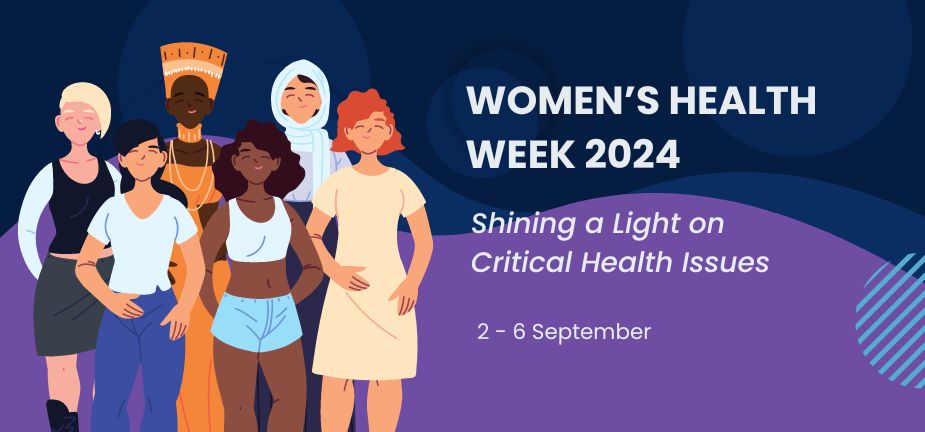As we start September, let’s reflect on what Women’s Health Week means and aims to achieve: it serves as a crucial reminder of the ongoing health challenges faced by women in Australia.
This week is an opportunity to raise awareness and advocate for better healthcare outcomes, particularly for issues that are often overlooked or stigmatised. Leading voices in the field of women’s health, amplify the issues we have long championed such as the need for comprehensive care and support for women, especially in addressing the stigma surrounding menstruation, misdiagnosis of common conditions, and the unique hardships faced by culturally and linguistically diverse communities.
Breaking the Silence on Menstrual Health
One of the key areas of focus during Women’s Health Week is the stigma surrounding menstrual health. Conditions such as heavy menstrual bleeding, endometriosis, and polycystic ovary syndrome (PCOS) are not only life-altering but are also frequently misunderstood or dismissed. Endometriosis, for instance, can take an average of 7 to 10 years to diagnose, often leading to prolonged pain, suffering, and mental health struggles. Heavy menstrual bleeding, which affects one in five women, can significantly impact daily life, yet it is often normalized or ignored in medical consultations.
As we stress the importance of breaking the silence around these conditions, women must be empowered to speak openly about their symptoms without fear of judgment or dismissal. Early diagnosis and appropriate treatment are crucial in improving quality of life and preventing long-term health complications.
The Journey Through Perimenopause and Menopause
Perimenopause and menopause are natural phases in a woman’s life, yet they are often accompanied by a range of challenging symptoms that can affect both physical and mental health. Despite the significant impact these stages can have, there is a lack of awareness and understanding about managing symptoms like hot flushes, mood swings, and sleep disturbance. This gap in knowledge can lead to women suffering in silence, not realising that help is available.
Advocates call for greater education and resources to support women through these transitions. Healthcare providers need to be well-informed about the latest treatments and supportive measures to help women navigate perimenopause and menopause with confidence and dignity.
Addressing Birth Trauma and Family Violence
Birth trauma and intimate partner violence are other critical issues that require urgent attention. Birth trauma, which can be physical or psychological, affects many women and can lead to long-term mental health issues such as post-traumatic stress disorder (PTSD). Meanwhile, family and intimate partner violence remains a pervasive issue that disproportionately affects women, often leaving them with both physical injuries and deep emotional scars.
Women’s health experts emphasize the need for trauma-informed care, where healthcare providers are trained to recognize and respond to the signs of birth trauma and domestic violence. Ensuring that women have access to safe and supportive care environments is essential in helping them heal and reclaim their lives.
The Impact on Culturally and Linguistically Diverse Communities
Women from culturally and linguistically diverse (CALD) communities face additional challenges when accessing healthcare. Language barriers, cultural stigmas, and a lack of culturally sensitive services can prevent these women from seeking the care they need. Conditions like endometriosis and PCOS are often even less understood in these communities, leading to delays in diagnosis and treatment.
AFMW joins others as we advocate for healthcare systems that are more inclusive and responsive to the needs of CALD women. This includes providing translation services, culturally appropriate health education, and training healthcare providers to deliver care that respects cultural differences.
Poverty and Ageing: The Double Burden for Women
As women age, they often face the double burden of poverty and declining health. Women generally earn less than men over their lifetimes, which translates into lower superannuation savings and a higher risk of poverty in old age. Managing health conditions in later life can be costly, and the financial strain can prevent older women from accessing necessary healthcare services.
Addressing this issue requires a multi-faceted approach. Advocates call for policy changes that ensure better financial security for women, such as closing the gender pay gap, improving superannuation entitlements, and increasing access to affordable healthcare. By tackling the root causes of poverty among ageing women, we can help them live healthier, more dignified lives.
Moving Forward
Women’s Health Week is a time to reflect on the progress made in women’s health and the work still to be done. By addressing the stigma of periods, improving the diagnosis and treatment of common conditions, and advocating for vulnerable communities, we can move towards a future where all women have the opportunity to lead healthy, fulfilling lives.
As we continue to push for change, it’s clear that the path to better women’s health requires collective effort and unwavering commitment. This Women’s Health Week, let’s join the conversation and work together to create a healthcare system that truly supports every woman, at every stage of her life.
The Australian Federation of Medical Women (AFMW) is a not for profit, politically neutral, non sectarian, non government organisation that seeks to improve the health of all Australians, especially the health of women and children.
Events and Updates coordination by AFMW, on behalf of the Australian Federation of Medical Women (AFMW), its affiliated Australian state and territory partners and international networks and supporters. If you have an update or event you would like to share with us for Australian medical women, please contact us with details. Thank you.

